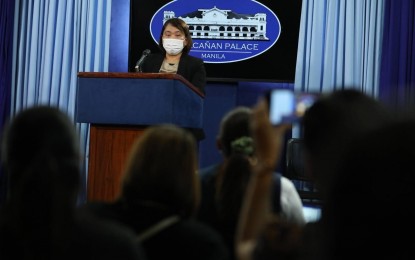
Office of the Press Secretary officer-in-charge Cheloy Garafil (Photo courtesy of OPS)
MANILA – Office of the Press Secretary (OPS) officer-in-charge (OIC) Cheloy Garafil on Wednesday said her office will be implementing several programs aimed at fighting fake news.
This, after private polling firm Pulse Asia found that nine of 10 Filipinos consider fake news as a problem in the Philippines.
In a Palace press briefing, Garafil agreed that the proliferation of fake news is a “serious” issue that needs to be addressed.
“Ito po ay isang seryosong bagay na tututukan ng OPS. Kaya ngayon, meron kaming mga programa na ili-lay down in the coming days (This is a serious matter that the OPS will focus on. That’s why we will lay down various programs in the coming days),” she said.
Garafil noted that “in the coming days,” the OPS would take several measures to combat the spread of misinformation and disinformation.
“We’ll let you know kasi gusto rin talaga natin na ma-address itong mga problema ng fake news (because we also want to address the problems on fake news),” she said.
Around 86 percent of 1,200 adult Filipinos believed that fake news is a problem, according to Pulse Asia’s Sept. 17 to 21 survey.
The sentiment was more pronounced in Metro Manila (87 percent) and the rest of Luzon (92 percent) than the Visayas (77 percent) and Mindanao (81 percent), Pulse Asia noted.
The opinion was also more prevalent among Classes ABC (87 percent) and D (93 percent) than Class E (74 percent).
“Sizable majorities,” Pulse Asia said, identified either social media (68 percent) or television (67 percent) as their source of fake news.
Radio (32 percent) and friends or acquaintances (28 percent) were the second group of fake news sources, the survey showed.
Around 21 percent of adult Filipinos said they are receiving fake political news from family or relatives.
Pulse Asia found that 58 percent are convinced that “social media influencers, bloggers, and/or vloggers are responsible for spreading fake political news in the country.”
President Ferdinand “Bongbong” Marcos Jr. earlier expressed optimism that communication experts would join his administration in its fight against misinformation and fake news by using their voices to “leverage positive communication in stirring the nation towards full recovery and lasting unity."
Garafil, a journalist-turned-lawyer, vowed Monday that the OPS will uphold “transparency, accuracy, and accountability” in delivering and disseminating information on the Marcos administration's policies, programs, and activities.
She added that her office seeks a wider public engagement to keep more Filipinos aware of the government's plans for the country. (PNA)
